Gardener Falconwood
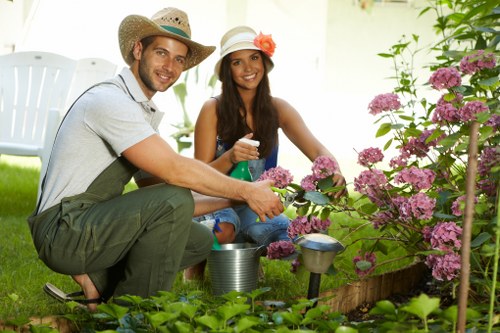
Gardener Falconwood is a picturesque community renowned for its lush landscapes and vibrant gardening culture. Nestled in a serene locale, Falconwood offers residents and visitors alike a tranquil environment where nature thrives.
The role of a gardener in Falconwood goes beyond mere planting. It encompasses the maintenance of beautiful gardens, the cultivation of diverse plant species, and the creation of sustainable green spaces that enhance the overall aesthetic of the area.
In Falconwood, gardening is not just a hobby but a way of life. The community places a high value on environmental stewardship, encouraging practices that promote biodiversity and ecological balance.
The Importance of Gardening in Falconwood
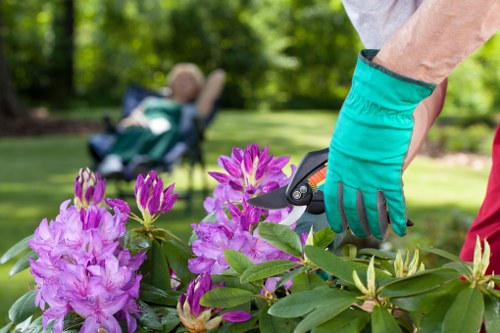
Gardening in Falconwood plays a crucial role in maintaining the area's natural beauty. Well-tended gardens contribute to the local ecosystem by providing habitats for various species of birds, insects, and other wildlife.
Moreover, gardening activities help in reducing the carbon footprint by enhancing air quality and sequestering carbon dioxide. The green spaces in Falconwood serve as lungs for the community, offering fresh air and a respite from urban life.
Community gardens also foster social interaction and community spirit. They provide a space for residents to come together, share gardening tips, and collaborate on maintaining shared green areas.
Skills and Responsibilities of a Falconwood Gardener
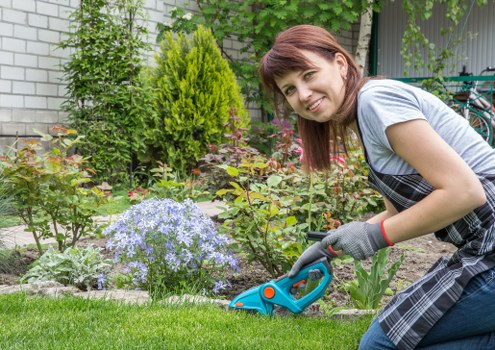
A gardener in Falconwood must possess a diverse set of skills to manage and maintain the extensive gardens of the community. These skills include:
- Plant Knowledge: Understanding the needs of various plant species to ensure their healthy growth.
- Soil Management: Maintaining soil fertility and structure for optimal plant development.
- Irrigation Techniques: Implementing efficient watering systems to conserve water.
- Landscape Design: Planning and creating aesthetically pleasing garden layouts.
- Pest Management: Controlling pests organically to protect plants without harming the environment.
Tools and Equipment Used by Falconwood Gardeners
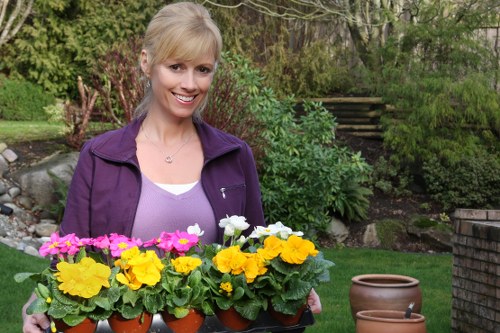
To effectively manage gardens, Falconwood gardeners rely on a variety of tools and equipment:
- Hand tools such as trowels, pruners, and hoes for detailed gardening tasks.
- Power tools like lawnmowers and hedge trimmers for maintaining larger areas.
- Watering systems including sprinklers and drip irrigation to ensure plants receive adequate moisture.
- Organic fertilizers and composters to enrich the soil naturally.
- Protective gear such as gloves and hats to ensure the safety and comfort of gardeners.
Gardening Techniques and Practices in Falconwood
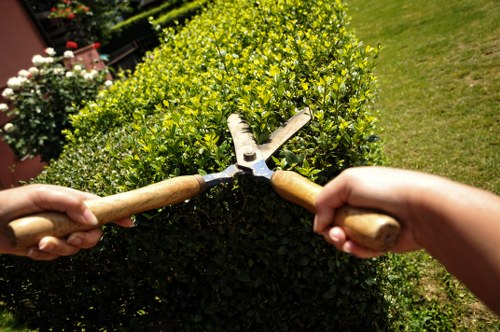
Falconwood gardeners employ a variety of techniques to cultivate healthy and sustainable gardens:
- Crop Rotation: Alternating the types of plants grown in a particular area to prevent soil depletion.
- Companion Planting: Growing compatible plants together to enhance growth and deter pests.
- Mulching: Applying organic materials to retain soil moisture and suppress weeds.
- Pruning: Regularly trimming plants to promote healthy growth and remove dead or diseased parts.
- Integrated Pest Management: Using a combination of biological, cultural, and chemical methods to manage pests.
Challenges Faced by Gardeners in Falconwood
Despite the beauty and rewards of gardening in Falconwood, gardeners often face several challenges:
- Climate Variability: Unpredictable weather patterns can affect plant growth and garden planning.
- Pest Infestations: Controlling pests without harming beneficial insects requires careful management.
- Soil Quality: Maintaining fertile soil is essential for healthy plants, which can be challenging in certain areas.
- Resource Management: Efficiently managing water and other resources is crucial for sustainable gardening.
- Space Constraints: In densely populated areas, finding adequate space for gardening can be difficult.
Benefits of Gardening for Falconwood Residents
Gardening offers numerous benefits to the residents of Falconwood:
- Physical Health: Gardening activities provide regular physical exercise, improving strength and flexibility.
- Mental Well-being: Engaging with nature reduces stress and enhances overall mental health.
- Community Building: Shared gardening projects foster a sense of community and collaboration.
- Environmental Impact: Gardens contribute to improved air quality and increased biodiversity.
- Economic Savings: Growing one's own vegetables and herbs can lead to significant cost savings.
Local Flora and Fauna in Falconwood Gardens
Falconwood's gardens are home to a diverse array of plants and wildlife:
- Plants: Native species such as oak trees, lavender, and roses thrive alongside seasonal vegetables and herbs.
- Pollinators: Bees, butterflies, and hummingbirds are common visitors, aiding in plant pollination.
- Wildlife: Birds, squirrels, and other small animals find shelter and food in the garden ecosystems.
- Beneficial Insects: Ladybugs and praying mantises help control pest populations naturally.
- Fungi and Microorganisms: Essential for soil health, these organisms break down organic matter and recycle nutrients.
Community Initiatives Supporting Gardening in Falconwood
Falconwood has several community initiatives aimed at supporting and promoting gardening:
- Community Gardens: Shared spaces where residents can cultivate their own plots and collaborate on gardening projects.
- Workshops and Classes: Educational programs that teach gardening skills and sustainable practices.
- Seed Swaps: Events where gardeners can exchange seeds and plant varieties to diversify their gardens.
- Garden Clubs: Organizations that bring together gardening enthusiasts to share knowledge and resources.
- Environmental Programs: Initiatives focused on conservation and the promotion of eco-friendly gardening techniques.
Tools for Aspiring Gardeners in Falconwood
For those interested in starting their gardening journey in Falconwood, having the right tools is essential:
- Basic Gardening Tools: A set of hand tools including a trowel, pruners, and a hoe.
- Watering Equipment: A reliable hose or watering can to ensure plants receive adequate moisture.
- Soil Testing Kits: Tools to assess soil quality and determine necessary amendments.
- Composting Bins: Containers for recycling kitchen and garden waste into nutrient-rich compost.
- Protective Gear: Gloves, hats, and aprons to protect against the elements and injuries.
Seasonal Gardening Tips for Falconwood
Adapting gardening practices to the seasons ensures a thriving garden throughout the year:
- Spring: Prepare the soil, plant new seeds, and start pruning trees and shrubs.
- Summer: Focus on watering, weeding, and managing pests to protect plants from heat stress.
- Autumn: Harvest mature crops, plant bulbs for spring, and clean up garden beds.
- Winter: Protect sensitive plants from frost, plan garden layouts, and perform maintenance on tools.
Sustainable Gardening Practices in Falconwood
Sustainability is a key focus for gardeners in Falconwood, who strive to minimize their environmental impact:
- Organic Farming: Avoiding synthetic pesticides and fertilizers to maintain soil health.
- Water Conservation: Implementing drip irrigation and rainwater harvesting to reduce water usage.
- Composting: Recycling organic waste to create natural fertilizers.
- Native Plants: Choosing plants that are well-suited to the local climate and require less maintenance.
- Permaculture: Designing gardens that mimic natural ecosystems for greater resilience and productivity.
Gardening Events and Festivals in Falconwood
Falconwood hosts a variety of events that celebrate gardening and bring the community together:
- Annual Garden Show: Showcasing the best gardens and providing workshops and seminars.
- Plant Fairs: Opportunities to purchase unique plants and gardening supplies.
- Harvest Festivals: Celebrating the bounty of the season with food, music, and activities.
- Workshops: Hands-on sessions on topics like composting, pruning, and landscape design.
- Garden Tours: Guided visits to some of the most beautiful and innovative gardens in Falconwood.
Local Gardening Resources in Falconwood
Residents can access a wealth of resources to support their gardening endeavors:
- Public Libraries: Offering books, magazines, and online resources on gardening.
- Nurseries and Garden Centers: Providing a wide selection of plants, tools, and expert advice.
- Online Forums: Platforms for discussing gardening techniques and sharing experiences with fellow gardeners.
- Community Workshops: Educational sessions hosted by local experts and enthusiasts.
- Extension Services: Government-supported programs that offer assistance and information to gardeners.
Gardening Success Stories in Falconwood
Many residents have achieved remarkable success with their gardens, transforming their spaces into lush, vibrant oases:
- The Green Haven: A community garden that features a variety of vegetables, herbs, and ornamental plants, managed by volunteers dedicated to sustainable practices.
- Blooming Roses: An individual garden renowned for its stunning rose varieties and meticulous care, serving as an inspiration to other gardeners.
- Butterfly Garden: A specialized garden designed to attract and support butterfly populations through the cultivation of nectar-rich plants.
- Urban Oasis: A rooftop garden that maximizes limited space to create a green retreat in the heart of Falconwood.
- Children’s Garden: A space dedicated to educating young residents about gardening, nature, and environmental responsibility.
Tools and Equipment Maintenance
Proper maintenance of gardening tools is essential for their longevity and effectiveness:
- Cleaning: Regularly removing dirt and debris to prevent rust and wear.
- Sharpening: Keeping blades sharp for efficient cutting and pruning.
- Lubrication: Applying oil to moving parts to ensure smooth operation.
- Storage: Keeping tools in a dry, organized space to protect them from the elements.
- Repairs: Addressing minor damages promptly to avoid more significant issues.
Gardening for All Ages in Falconwood
Gardening is an inclusive activity that can be enjoyed by people of all ages in Falconwood:
- Children: Learning about plant growth, responsibility, and the environment through hands-on activities.
- Adults: Engaging in a rewarding hobby that offers physical exercise and mental relaxation.
- Seniors: Providing therapeutic benefits and opportunities for social interaction.
- Families: Strengthening bonds through shared gardening projects and outdoor activities.
- Individuals with Disabilities: Offering adaptive gardening tools and accessible garden spaces to accommodate diverse needs.
Local Gardening Clubs and Associations
Joining local gardening clubs and associations can enhance the gardening experience:
- Falconwood Garden Club: A community organization that hosts events, workshops, and garden tours.
- Horticultural Society: Promoting the study and cultivation of plants through research and education.
- Urban Farming Groups: Supporting sustainable agriculture practices within the community.
- Botanical Enthusiasts: Bringing together individuals passionate about plant diversity and conservation.
- Environmental Advocacy Groups: Advocating for eco-friendly gardening practices and policies.
Gardening and Local Economy
Gardening contributes positively to Falconwood's local economy:
- Employment: Creating jobs in nurseries, garden centers, and landscaping services.
- Local Businesses: Supporting businesses that provide gardening supplies, tools, and services.
- Tourism: Attracting visitors to garden events, festivals, and scenic garden locations.
- Property Values: Enhancing the attractiveness of neighborhoods, thereby increasing property values.
- Agricultural Sales: Generating revenue through the sale of locally grown produce and plants.
Technological Innovations in Gardening
Modern technology has revolutionized gardening practices in Falconwood:
- Smart Irrigation Systems: Automated watering systems that optimize water usage based on weather and soil conditions.
- Gardening Apps: Mobile applications that provide planting schedules, pest identification, and gardening tips.
- Vertical Gardening: Utilizing vertical space to maximize growing areas in limited spaces.
- Hydroponics: Soil-less gardening techniques that allow for year-round cultivation of plants.
- Drones: Assisting in monitoring large garden areas and assessing plant health.
Gardening and Education
Education plays a vital role in promoting effective gardening practices:
- Schools: Incorporating gardening programs into curricula to teach students about biology and ecology.
- Workshops: Offering skill-building sessions for beginner and advanced gardeners.
- Online Courses: Providing accessible learning opportunities for those unable to attend in-person classes.
- Community Seminars: Hosting informational talks on topics like composting, pest management, and sustainable gardening.
- Public Libraries: Supplying resources and literature on various aspects of gardening.
Sustainable Landscape Design in Falconwood
Designing sustainable landscapes is a key focus for Falconwood gardeners:
- Native Plants: Selecting plants that are adapted to the local climate and soil, requiring less maintenance and water.
- Water-Efficient Systems: Incorporating rainwater harvesting and graywater recycling to conserve resources.
- Green Roofing: Utilizing rooftop spaces to grow plants, improving insulation and reducing urban heat islands.
- Permeable Paving: Installing surfaces that allow water to seep through, reducing runoff and improving groundwater recharge.
- Renewable Materials: Using sustainable materials for garden structures and pathways.
Gardening and Climate Change
Gardening practices in Falconwood are adapting to the challenges posed by climate change:
- Drought-Resistant Plants: Choosing species that can withstand prolonged dry periods.
- Carbon Sequestration: Planting trees and other vegetation that capture and store carbon dioxide.
- Heat-Tolerant Varieties: Cultivating plant varieties that thrive in higher temperatures.
- Flood Management: Designing gardens that can absorb and manage excess rainfall and prevent flooding.
- Energy-Efficient Lighting: Utilizing solar-powered lights to reduce energy consumption.
Gardening and Mental Health
Engaging in gardening activities offers significant mental health benefits:
- Stress Reduction: Spending time in nature and engaging in physical activity lowers stress levels.
- Mood Improvement: Gardening has been shown to alleviate symptoms of depression and anxiety.
- Mindfulness: The act of gardening promotes mindfulness and present-moment awareness.
- Sense of Accomplishment: Successfully growing plants provides a sense of achievement and boosts self-esteem.
- Social Interaction: Participating in community gardening fosters social connections and reduces feelings of isolation.
Gardening and Biodiversity in Falconwood
Maintaining biodiversity is essential for the health of Falconwood's gardens:
- Plant Diversity: Growing a wide variety of plants supports different wildlife species and prevents monocultures.
- Habitat Creation: Designing gardens to provide shelter and food for birds, insects, and other animals.
- Pollinator Support: Planting nectar-rich flowers to attract and sustain pollinators like bees and butterflies.
- Invasive Species Control: Managing and removing non-native species that threaten local ecosystems.
- Genetic Diversity: Preserving diverse plant genetics to enhance resilience against pests and diseases.
Garden Design Trends in Falconwood
Current garden design trends in Falconwood emphasize sustainability and functionality:
- Minimalist Gardens: Focusing on simplicity and uncluttered spaces with clean lines.
- Edible Landscaping: Integrating fruit trees, vegetable beds, and herb gardens into ornamental landscapes.
- Water Features: Incorporating ponds, fountains, and waterfalls to add tranquility and attract wildlife.
- Outdoor Living Spaces: Creating areas for relaxation and entertainment, such as patios and pergolas.
- Vertical Gardens: Maximizing space by growing plants on walls and vertical structures.
Gardening and Community Well-being
Gardening contributes to the overall well-being of the Falconwood community:
- Enhanced Aesthetics: Beautiful gardens improve the visual appeal of neighborhoods and public spaces.
- Environmental Health: Green spaces contribute to cleaner air, reduced temperatures, and improved water quality.
- Community Pride: Well-maintained gardens foster a sense of pride and ownership among residents.
- Recreational Opportunities: Gardens provide spaces for leisure activities like walking, picnicking, and bird watching.
- Educational Value: Gardens serve as living classrooms for teaching about ecology and sustainability.
Upcoming Gardening Projects in Falconwood
Several exciting gardening projects are underway in Falconwood:
- Urban Green Spaces: Developing new parks and green corridors to enhance connectivity and biodiversity.
- Community Composting: Launching composting programs to recycle organic waste and enrich garden soil.
- Rain Gardens: Installing rain gardens to manage stormwater runoff and promote groundwater recharge.
- Native Plant Restoration: Restoring areas with indigenous plants to support local wildlife and ecosystems.
- School Gardens: Establishing gardens in schools to educate students about gardening and environmental stewardship.
Gardening and Cultural Heritage
Gardening in Falconwood also reflects the community's cultural heritage:
- Traditional Planting Techniques: Preserving age-old gardening methods passed down through generations.
- Cultural Plant Varieties: Growing plants that hold cultural significance to the diverse population of Falconwood.
- Festivals and Celebrations: Hosting events that celebrate the history and traditions of gardening in the community.
- Intergenerational Learning: Encouraging the sharing of gardening knowledge between older and younger residents.
- Art and Sculpture: Integrating artistic elements into garden designs to honor cultural heritage.
Sustainable Practices for Long-Term Gardening Success
Implementing sustainable practices ensures the long-term success of gardens in Falconwood:
- Resource Efficiency: Optimizing the use of water, energy, and materials to minimize waste.
- Soil Health: Maintaining rich, fertile soil through organic amendments and crop rotation.
- Renewable Energy: Utilizing solar-powered tools and lighting to reduce reliance on non-renewable sources.
- Waste Reduction: Composting organic waste and recycling materials to create a closed-loop system.
- Community Collaboration: Working together to share resources, knowledge, and support for sustainable gardening.
Final Thoughts on Gardening in Falconwood
Gardening in Falconwood is a cherished activity that enhances the beauty, sustainability, and community spirit of the area. Whether you're a seasoned gardener or just starting out, Falconwood offers a supportive environment filled with resources, opportunities, and a shared passion for nurturing green spaces.
Embracing gardening in Falconwood not only contributes to personal well-being but also fosters a healthier, more vibrant community for all to enjoy.
Frequently Asked Questions
1. What are the best plants to grow in Falconwood's climate?
Falconwood's climate is well-suited for a variety of native and drought-resistant plants such as lavender, roses, oak trees, and seasonal vegetables like tomatoes and lettuce.
2. How can I start a community garden in Falconwood?
To start a community garden, you can reach out to local gardening clubs, attend community meetings, and collaborate with neighbors to secure a suitable location and necessary resources.
3. What resources are available for new gardeners in Falconwood?
New gardeners can access resources through public libraries, local nurseries, online forums, community workshops, and extension services that offer guidance and support.
4. How can I make my garden more sustainable?
Implement sustainable practices such as using native plants, conserving water with efficient irrigation systems, composting organic waste, and avoiding synthetic pesticides and fertilizers.
5. Are there any gardening events I can participate in Falconwood?
Yes, Falconwood hosts various gardening events including annual garden shows, plant fairs, harvest festivals, workshops, and garden tours that you can participate in.